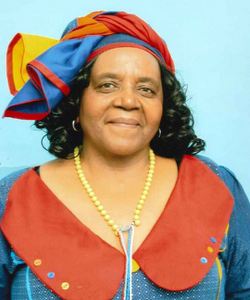 Born in Nqamakwe, in the Eastern Cape, Nontobeko Daphne Moletsane, has spent much of her professional life working on community-based projects aimed at improving the well-being of people living in rural areas. Starting her working life as a teacher at Healdtown and Magalakanqa Higher Primary School, she left the profession to train as a nurse. She rose quickly through the ranks to serve as matron at the Zanempilo Community Health Centre in King William’s Town, specialising in midwifery and maternal health.
Born in Nqamakwe, in the Eastern Cape, Nontobeko Daphne Moletsane, has spent much of her professional life working on community-based projects aimed at improving the well-being of people living in rural areas. Starting her working life as a teacher at Healdtown and Magalakanqa Higher Primary School, she left the profession to train as a nurse. She rose quickly through the ranks to serve as matron at the Zanempilo Community Health Centre in King William’s Town, specialising in midwifery and maternal health.
During the political turbulence of the 1970s and 1980s, Nontobeko was active in organisations fighting the social injustices forced on the country through apartheid. Her starting point in what has become a life-long journey of service to her people was as a fieldworker for Sikunyenani (a branch of the Zimele Trust) which assisted the families of people imprisoned on Robben Island for their anti-apartheid activities. The organisation was banned from operating by the state.
Nontobeko then returned to her passion for education and for the next 15 years, worked in organisations leading the struggle for equal education for all. This included the SACHED Trust; the Masifundise Educational Trust and the national NGO, Trust for Community and Educational Outreach (TCOE) where she served as executive director.
Continuing in her quest for justice and reconciliation, she played an important leadership role as Executive Chairperson for Special Pensions, ensuring that people who fought in the liberation struggle were able to access this social assistance to help them to re-build their lives.
She holds the firm belief that people need to design and drive their own development. As a result, she has devoted considerable energy to initiatives that enable participatory community development. She served as a board member of the National Development Agency (NDA) for six years from its inception. Currently, she works with the Letsema Circle Trust (LCT), an NGO which seeks to facilitate transformation of the health system to a community-centered preventive model, as opposed to the more prevalent curative model currently practised. The ‘Amalima’ philosophy of the LCT taps into the African cultural practice of collective action by communities to tackle their challenges and solve them together (the Letsema Process). LCT works with communities to help them explore a deeper understanding of their fears, hopes and aspirations; and most of all, their potential to take ownership of their own health and wellness.
Presently, Nontobeko Moletsane heads the Gender Desk in the Anglican Church (Diocese of Grahamstown), as part of her commitment towards building a society that is egalitarian and free from all forms of discrimination.
For her steadfast dedication towards the upliftment of communities through providing mentorship to enable active participation in their own development, and her contribution in the fields of community health and access to education, Nelson Mandela Metropolitan University is honoured to present Nontobeko Daphne Moletsane with the Council Prestige Award.